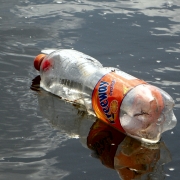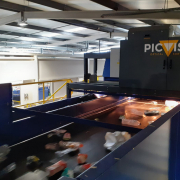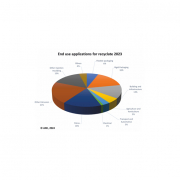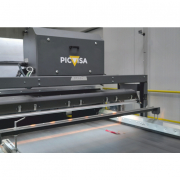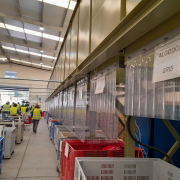From Bottle to Flake: Pioneering the Path to Sustainable Plastic Recycling
In an era where sustainability transcends choice to become a necessity, the transformation of plastic from bottle to flake symbolizes the epitome of recycling, embodying the circular economy’s principles. This journey, initiated by individuals depositing their used plastic bottles, culminates in these materials being reborn as pellets ready for crafting new bottles, showcasing technological innovation and environmental stewardship.
Central to this recycling saga are the ECOPACK and ECOFLAKE systems by PICVISA, which streamline and enhance the efficiency of this process. ECOPACK, an optical sorter, leverages hyperspectral imaging to distinguish plastics based on composition and color. As bottles enter recycling facilities, mixed with other waste, ECOPACK’s precision in identifying and separating plastic bottles from the waste stream is indispensable. This accuracy in initial sorting ensures that only plastic bottles proceed to the next recycling stages, minimizing contamination and enhancing the quality of the final product.
Following sorting, the bottles are shredded into smaller pieces, or flakes, introducing ECOFLAKE into the narrative. Specializing in plastic flake recycling, ECOFLAKE employs advanced NIR technology and high-resolution cameras for further purification. It meticulously sorts flakes by color, transparency as well as composition, eliminating impurities and ensuring the integrity of the recycled plastic for food-grade packaging.
The integration of ECOPACK and ECOFLAKE into the recycling process not only makes recycling operations more efficient but also supports producing high-quality recycled pellets. These pellets are then used to manufacture new plastic bottles, achieving a closed loop in the plastic lifecycle. That practice conserves resources, reduces the demand for virgin plastic, and lessens the environmental impact of plastic waste.
Enhanced sorting accuracy
Moreover, these technologies enable recycling facilities to operate more sustainably and economically. Enhanced sorting accuracy leads to reduced processing times and energy consumption, lowering the carbon footprint. Additionally, the production of higher-quality recycled plastic can open new markets for recyclers, promoting the recycling of plastic waste.
European efforts in plastic recycling have seen significant advancements. According to Eurostat, the European Union’s statistical office, the recycling rate of plastic packaging waste has been steadily increasing, reaching over 42 percent in recent years. That indicates a growing commitment to recycling and the potential impact of technologies like ECOPACK and ECOFLAKE in achieving higher recycling rates.
The journey from bottle to flake, facilitated by ECOPACK and ECOFLAKE, reflects the potential of modern recycling to contribute to a more sustainable world. As the global community continues to address plastic waste challenges, these innovative solutions offer hope, demonstrating that technological advancement and collective effort can create a circular economy where the value of plastic is continuously renewed, fostering a more sustainable and environmentally conscious society.
(Published in GLOBAL RECYCLING Magazine 1/2024, Page 48 -Advertorial-, Photo: PICVISA)



